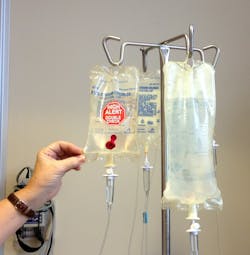Postmenopausal women with hormone receptor (HR)-positive, human epidermal growth factor receptor 2 (HER2)-negative breast cancer that has spread to a limited number of lymph nodes, and whose recurrence risk is relatively low, do not benefit from chemotherapy when it is added to hormone therapy, according to initial results from a clinical trial presented at the 2020 San Antonio Breast Cancer Symposium, according to a press release from the National Institutes of Health (NIH).
These findings may save tens of thousands of postmenopausal women each year the time, money, and harmful side effects that come with chemotherapy infusions, the NIH said.
This is the first evidence in a randomized phase III trial that postmenopausal women with HR-positive, HER2-negative breast cancer that has spread to one to three lymph nodes can safely forgo chemotherapy if their recurrence score on a genomic tumor tissue test is 25 or less. The trial also demonstrated, after a median of five years of follow-up, that premenopausal women with the same disease characteristics benefited from chemotherapy.
The study, SWOG S1007, known as RxPONDER, was supported by the National Cancer Institute, part of NIH. RxPONDER was an international effort, conducted at 632 sites in nine countries: the United States, Canada, Mexico, Colombia, Ireland, France, Spain, Korea, and Saudi Arabia.
RxPONDER follows the ground-breaking TAILORx study, which was also supported by NCI. TAILORx showed that postmenopausal women with lymph node-negative, HR-positive, HER2-negative breast cancer and recurrence scores of 25 or less on a genomic tumor tissue test saw no benefit from the addition of chemotherapy to hormone therapy compared with hormone therapy alone. These results, however, left open the question of the most effective way to treat women diagnosed with more advanced breast cancer that has spread to the lymph nodes.
Analyses of data from stored tumor samples of patients in an earlier SWOG clinical trial, S8814, had suggested that recurrence scores from patients with lymph node-positive breast cancer that is HR positive and HER2 negative could potentially predict chemotherapy benefit. The study team set out to find out if this was true, using a molecular test called the Oncotype DX Breast Recurrence Score. This test, also used in TAILORx, assesses the activity of 21 genes to generate a score that indicates the risk of recurrence. Scores range from 0 to 100, with 25 and below rated in the low or intermediate risk range.
The RxPONDER team screened 9,383 women with HR-positive, HER2-negative breast cancer and one to three positive lymph nodes to identify those with recurrence scores of 25 or less. A total of 5,083 such patients were randomly assigned to receive hormone therapy alone or hormone therapy plus several months of intravenous chemotherapy with taxane and/or anthracyclines, chemotherapy drugs that are considered standard treatment for this type of cancer. Two-thirds of the women in the trial were postmenopausal, and data from 5,015 eligible randomized patients were used in the current analysis.
All women were monitored for a median of five years to assess the trial's primary endpoint, invasive disease-free survival, or IDFS, a measure that counts which patients develop cancer that spreads outside of the breast, develop a new tumor inside a breast, or die from any cause. Overall survival was a secondary endpoint. As an independent data and safety monitoring committee began reviewing the trial results, they noticed a surprising pattern – one that was clear enough for the committee to recommend that findings be reported publicly before the final results were complete.
The researchers were surprised to find that in the study population, overall, there was no association between recurrence score and chemotherapy benefit. In other words, patients with a higher recurrence score did not have a greater benefit from chemotherapy than those with a lower score. However, there was an association with menopausal status. Postmenopausal women saw no benefit from chemotherapy, regardless of recurrence score. Among postmenopausal women, the five-year IDFS rate was 91.6 percent for the chemotherapy plus hormone therapy group and 91.9 percent for the hormone therapy-only group.
By contrast, among premenopausal women, the study found a statistically significant benefit from chemotherapy in IDFS: The five-year IDFS rate in premenopausal women was 94.2 percent for the chemotherapy and hormone therapy group, compared with 89.0 percent for the hormone therapy-only group. This benefit was seen regardless of recurrence score. Premenopausal women also appeared to experience an overall survival benefit in these early results. At five years, the overall survival rate was 98.6 percent for those receiving chemotherapy plus hormone therapy and 97.3 percent for women in the hormone therapy-only group.

